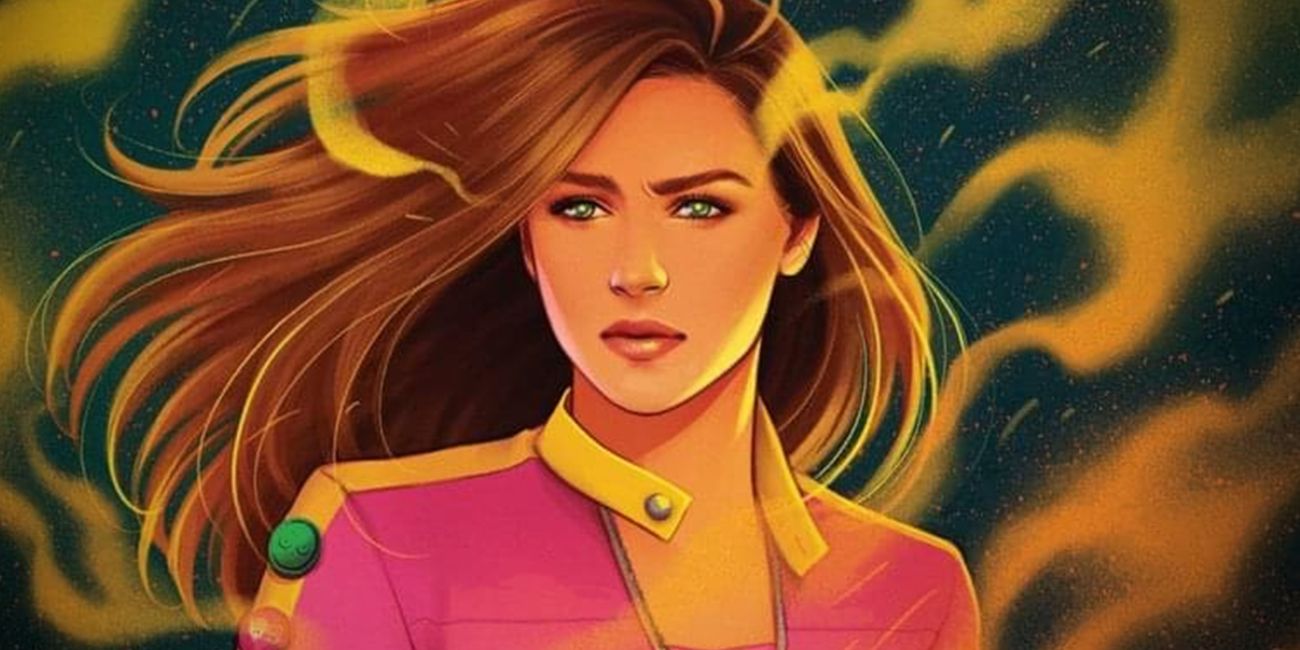
The leading role in HBO's Game of Thrones made Emilia Clarke a regular at Comic-Con, but she now stands ready to join the comic community with a book of her very own: M.O.M.: Mother of Madness.
Fans of Clarke's are likely to rally around the book coming from Image Comics, with hopes that the actress and producer might get the chance to bring such a superhero premise to life on screen (especially with a leading lady who bears more than a passing resemblance to Clarke herself). But comic fans won't want to miss what is already a heck of a narrative hook: what if a so-called 'supermom' actually unlocked real superpowers? And what if they developed monthly, coinciding with her menstrual cycle? The answer is the three-issue miniseries set to arrive July 21st from Image, co-written by Clarke and Marguerite Bennett (DC's Bombshells), with art from Leila Leiz. And fans can get their first look now!
Screen Rant was one of a handful of outlets invited to discuss the new series with Clarke, and find out how her own upbringing with comic books, her female perspective on superheroes as a whole, and her "comic guru" Bennett helped produce a tale she describes as Fleabag meets Deadpool. Readers can enjoy our full interview, including preview pages of M.O.M.: Mother of Madness #1 embedded below before the first issue arrives this July.
I'd love to know a little bit about the origin of the story, where the idea for the character came from, and how you settled on the comics being the best medium for it.
Emilia Clarke: It really started with a "Wouldn't it be funny if..." conversation in a car on the way to a gig. We were like, "Wouldn't that be mad if you sort of...?" Because we were talking about how mums are like superheroes, women have this incredible ability to have so much going on and manage to achieve all of those things. It's almost superpowered. We were laughing and joking about how this would be, and then it just stuck with me. I was like, "You know what? It would be really funny. It would be really cool. I think we should do it." And so I stuck to my guns and I carried on doing it.
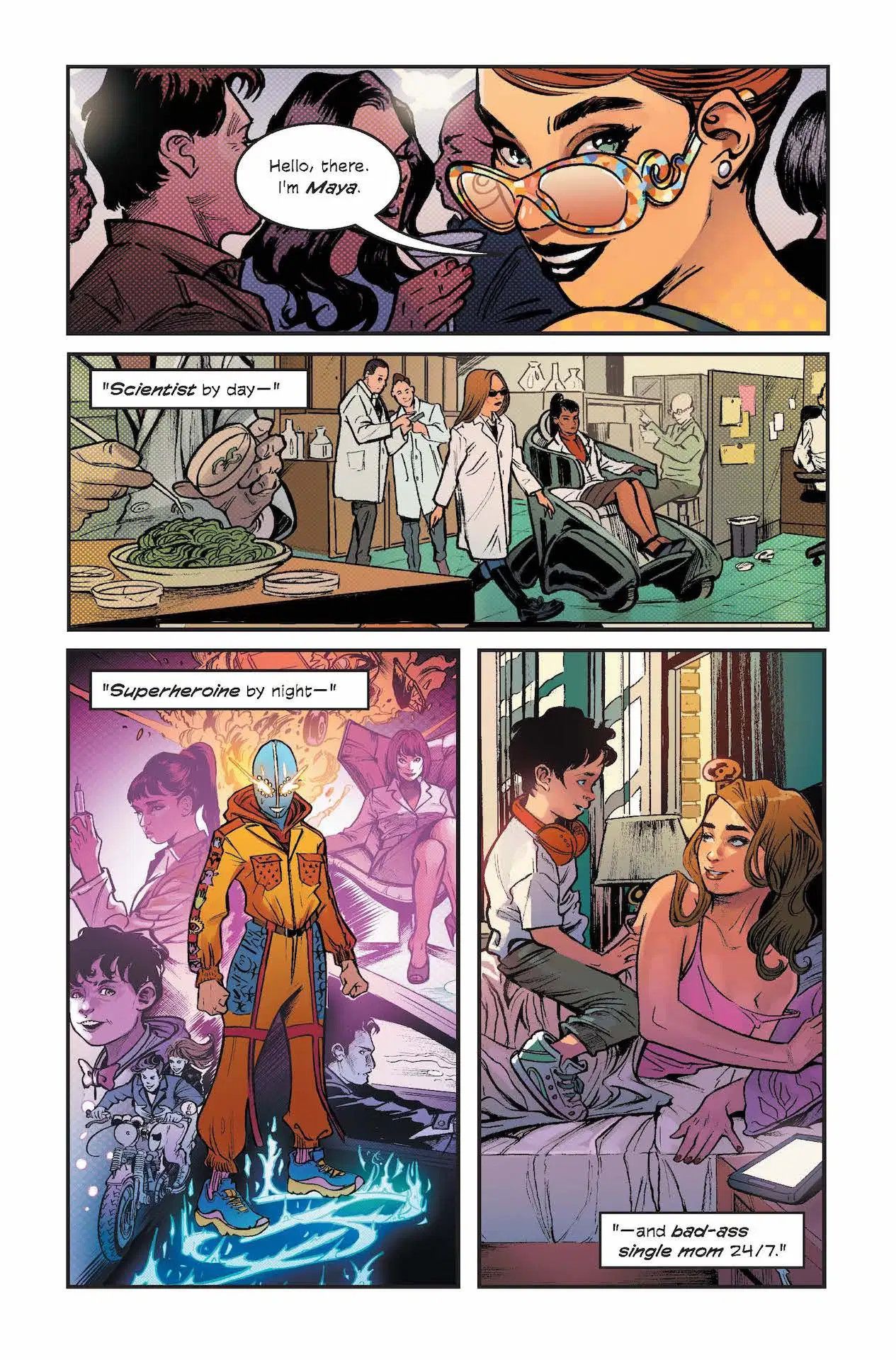
The reason why I wanted to approach - and it is - a feminist material in this space, within a comic book world, was that I love it. I love superheroes. I love comics; I love the freedom that you have. Your imagination, your creativity has no boundaries whatsoever from the fantasy fiction that I read as a kid - and I reread and reread and reread now - you're able to have anything [be] possible. So, what better way to tell a story than to have it in this world where literally anything is possible?
And you can voice opinions in a space that is also, in my opinion, friendly and for everyone and accepting of everyone. I feel so much that that's what the comic book world space does. It allows people who maybe don't feel like they - I'm talking about myself as a kid now - fit into the right group at the right time with the right thing. And you're not into the right [things], you don't look the right way, you don't feel the right way. Comic books are your private world, and you get to kind of unite in that otherness - which as you grow up into an adult, you realize it's all of us. It's just the cool kids at school. I'm sorry if you were any cool kids at school, I'm just gonna hate them for a minute.
But it just seemed like a really accepting space to be talking about these ideas, and fun. Fun is surely what we should be trying to do as much as possible.
Page 6 is a great splash page of Maya's powers, where you get to see them for the first time. What was it like when you got to see Leila [Leiz]'s artwork for the first time?
Emilia Clarke: Oh, it was amazing. It was absolutely amazing. Marguerite [Bennett] has been my guru in this, because whilst I am a consumer of comics and of the comic book world, I never made one before. So, there was a lot of stuff that I didn't know. So much stuff.
So, I met Marguerite and fell in love with her. And she has literally held my hand throughout this entire process; she's been like the queen, so I go to her with all these things. She was talking me through what a splash page was - because obviously, I know what it looks like, but not the actual correct terminology and all that kind of stuff.
I was saying, and I feel like we've achieved it with the comic, I want it to feel and look different. In the way that you have the very traditional comic book families, for want of a better word, there are very strict rules and guidelines that they have to follow from a visual and aesthetic point of view, but also from a storytelling point of view. And I wanted to just be able to throw that out the window, because we're not there. The world's your oyster.
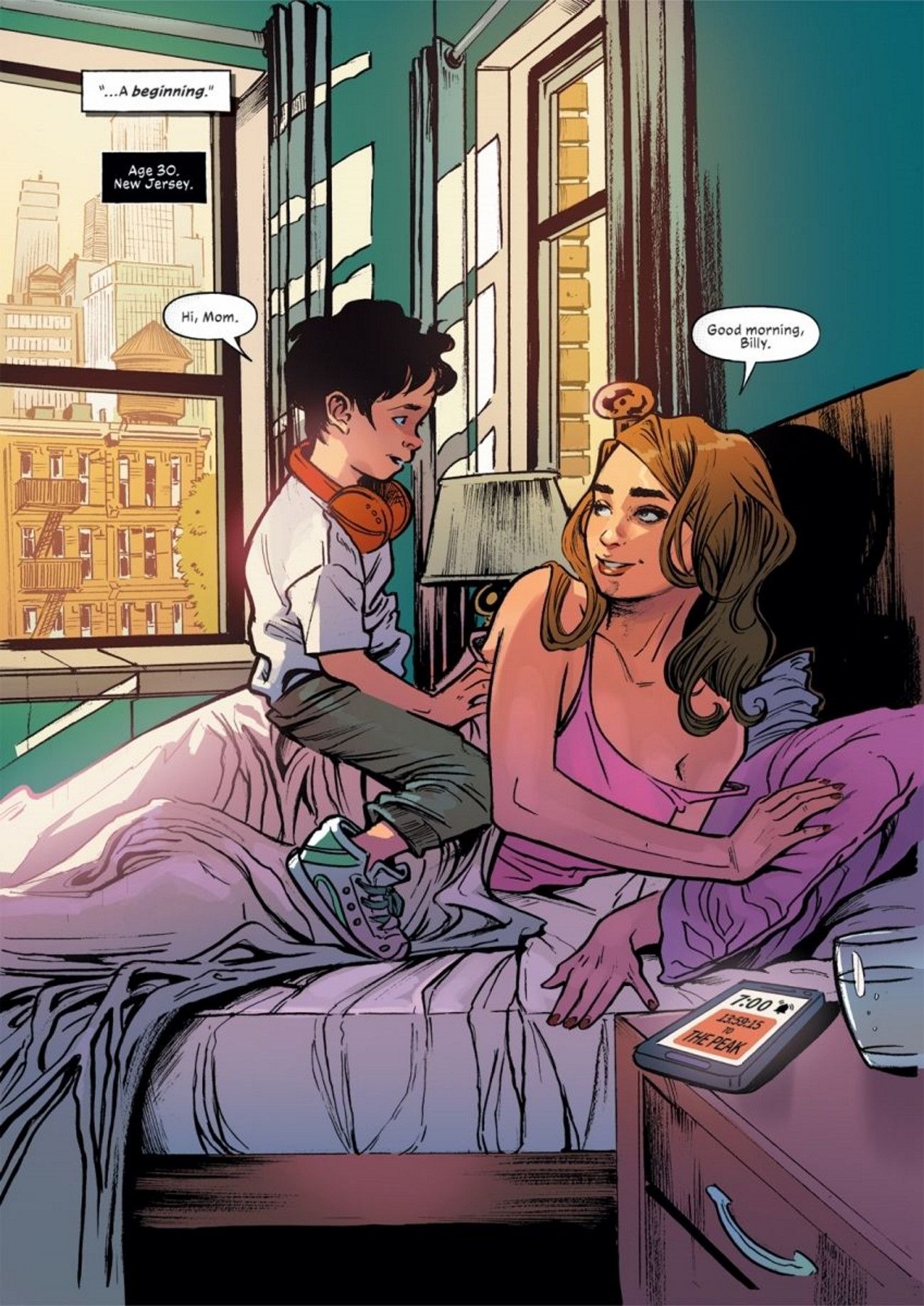
So, we found Leila. I fell in love with her artwork anyway, and then it was just giving her the freedom to try and do what she does best. Yeah, I think it probably was that image that I saw that completely blew my mind. And there's another one coming in a couple of editions that was like, "Oh my God, it's like you were in my head and you totally saw it."
It's just been the most fulfilling, exciting process at every turn, getting to see it grow and grow and grow and grow. Marguerite would write "splash page here," and I'd be like, "Mmm, exciting. Wonder what that's going to look like." They it would come in, and I'd be like, "Oh shit. Yes, that's exactly right!"
What was it like finding the character of Maya? Did write out backstory or do a biography before you dug into the scripting?
Emilia Clarke: Oh, yeah. Yes. I wrote out like 40 pages of story for the whole thing. And I wrote it all down in long form, like a mini-book. In it, I went chronologically, and then I would go in and hone in on each character. Obviously, Maya and her backstory made it in.
I wrote it in a chronological sense, so I wrote how she started life, what that family was, what all of that stuff was - and then take us to present day. And all of the individual characters that she meets, I gave them all of their own backstories and their own stuff. Then the world got its own PDF document, and then all of the images as to how I wanted her to look, and where all the influences are coming from. And then I would keep adding to it.
So, every time I came up with another stupid idea - I'm saying stupid, I'm allowed to do that. Please don't think they're stupid ideas, but they are. Every time I'd come up with a new weird thing, then I would go back and edit it. And Marguerite, bless her cotton socks, had that and was like, "Okay, right. We're gonna write this huge swath of pages."
The backstory of Maya is integral to the comic. As you guys know, with building character, every actor wants the monologue. They want the thing where they get to go, "Well, it all began when I was two, and this terrible thing happened." And so I wanted to really make sure that the woman that we saw in the first couple of pages was reflective of the environment in which she was raised in, and what made her unique and beautiful and special and wonderful is the fact that she has the power - emotionally, physically, spiritually - to overcome all of those things.
How did you come up with the fourth wall breaking element of the narration?
Emilia Clarke: Well, that is. I'm just gonna say that Deadpool is, like, my favorite movie. It's just so good. Like, I want to be Ryan Reynolds so badly. And that worked so well. And obviously you have Fleabag, and then House of Cards - and Shakespeare, dare I say it.
You've got all of these things where, especially with a book - because I feel I'm a bookworm, I read books and comics all the time. When reading that, it's such a personal experience. You feel a well-written story is just for you; that book is only for you, and you get a really emotional connection to it. So, I wanted to just hone in on that as much as possible by having Maya actually talk to the reader. Which I think is quite fun, when you get to speak to the person in the moment that they're reading it. It kind of then lives outside of time, which I really like.
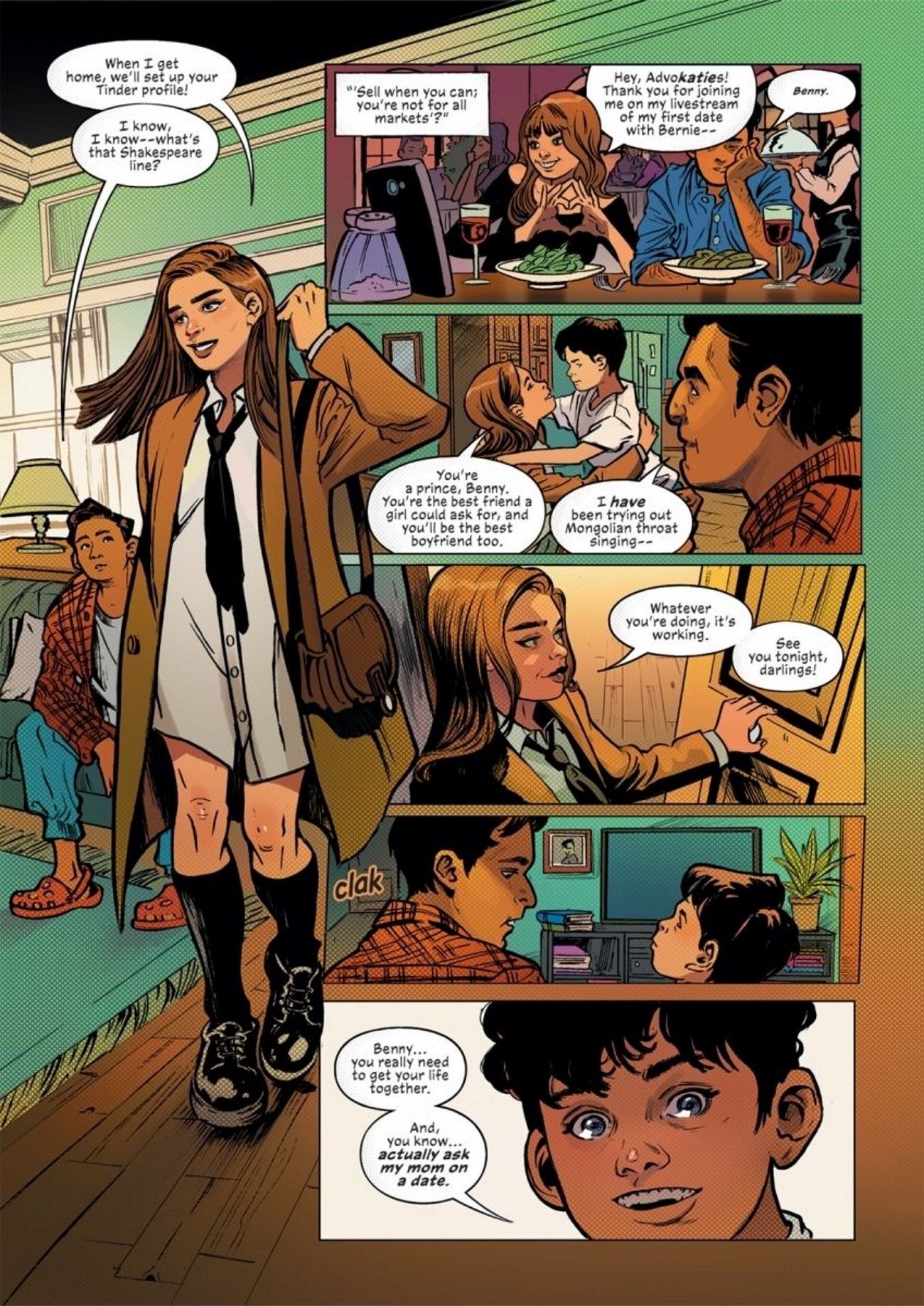
How did that partnership with, with Marguerite first come about, and what made her the perfect person to help sherpa your vision for Maya through to completion?
Emilia Clarke: It started with me joining forces with Image Comics. And that's when I was like, "Okay, who've you got?" I've only hired women at all - at every stage, every single person who has been in the making - from the letterer to the editor to the writer to everyone is a woman. And I was like, "Can you just give me your best female writers of comics that you guys think?"
Then I did my own research, and Marguerite's name came up. I met her, and she walked into the house that I was staying at in LA. Within a minute, I was like, "This is the nicest, smartest woman I've ever met. Come sit down, take a seat. I don't need to meet anyone else. Let's go!" Then just every time I met her, it just solidified it even more. She's just been so consistent and so right on.
And the thing that really spun it completely for me with Marguerite was that she really wanted to do it. She was like, "Yes, you've seen right here there's a gap for this. Let's do it." And she added so much to it, and was able to bring so much of her own battles and her own fights to this, and the stuff that she as a writer always wanted to do. Again, she seemed like the perfect person who - when I was like, "You've got free rein. I don't know what the rules are, so let's break them. Because I don't know what they are," - she just seemed to be really chomping at the bit for that opportunity.
Which is the sole reason why you should hire anyone: when they really, really want to do the job.
I would love to talk about the final page reveal of the costume as well, because I feel like that really leans into breaking the rules. You don't see her face, she's wearing a cool mask and a baggy costume. It's really cool, and I think that's definitely gonna be cosplayed.
Emilia Clarke: Absolutely, and cosplay is something I know a lot about. I remember the first time I was at a premiere, and I was like, "Oh my God, someone stole my costume. Someone went and actually nicked it." Like, that is unreal.
So, when it came to the costume, the first and foremost reason why I was like, "Let's have a female superhero that looks different," is because the female superheroes that you have - how do they pee? Do you know what I mean? Where is the button to undo when you ate too much? I realized it should be idealized, and you want to you try and be like, "Oh, they're some other person." But why?
Why can't you have a woman who looks like she could do the school run, she could enjoy a filling meal. She could pee, she could run around, she could actually do all of the things. And also, as someone who wears the costumes in the movies of these things, you're like, "Yeah, I couldn't do any of those things. I could barely breathe most of them." Let's give this character an opportunity to have something that actually makes you feel like yourself in it.
Then I really enjoy fashion, so it was looking at all of the different [options]. That was the funnest process, working out what her costume was gonna look like. And it began with Missy Elliott, in the 90s when she did that fisheye video - and she's in all those sick, shiny tracksuits. And then Rihanna, and the way that she bowls around. I was like, "These are some fierce, fierce women that look comfortable and can do a bunch of stuff." Yeah, that's how that came about.
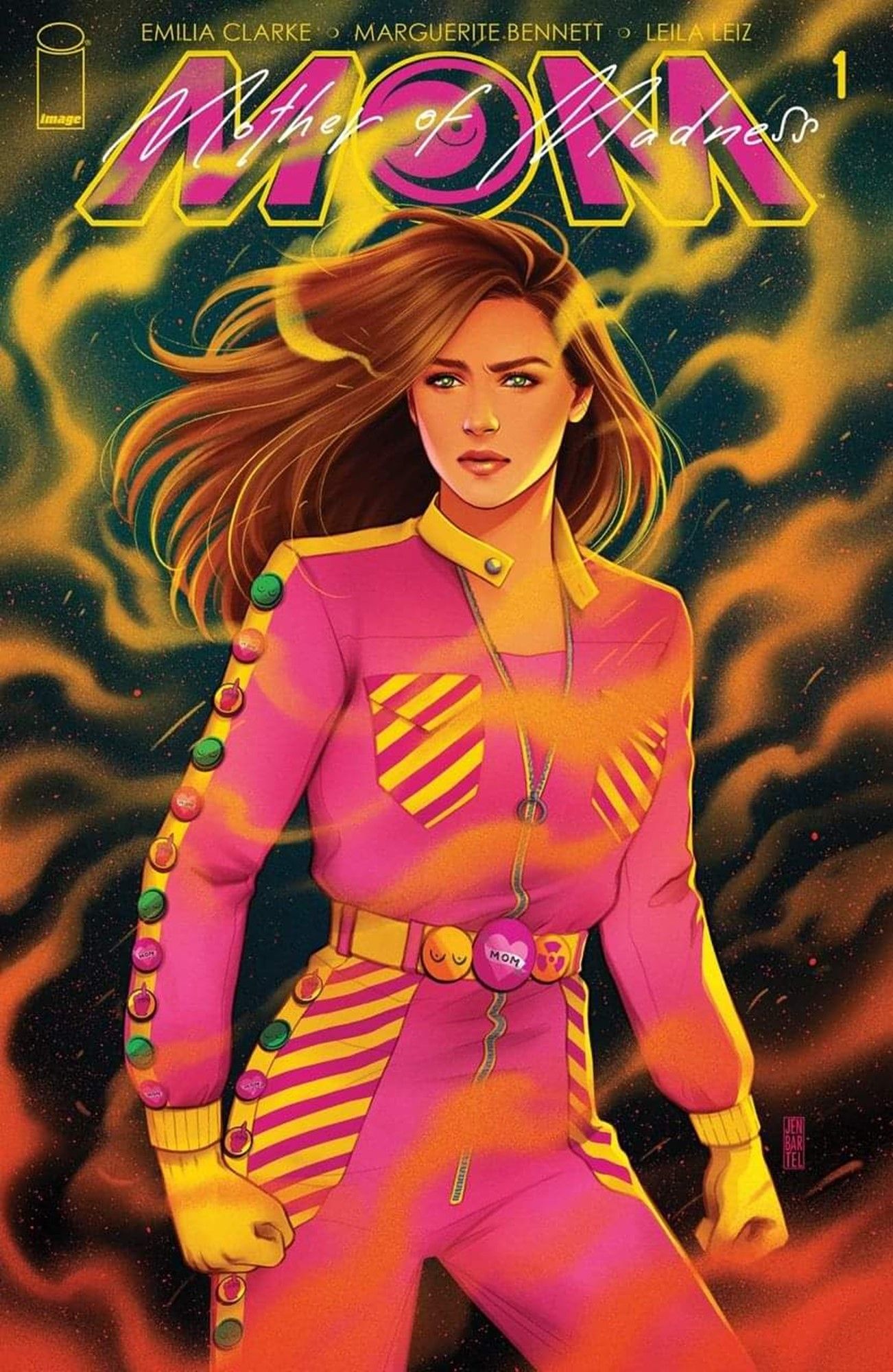
I have three daughters who are young. When I eventually hand them this book many years in the future, do you want it to educate or inspire them?
Emilia Clarke: Both? 100% both, because that's the other thing. This book is about a woman whose powers come from her menstrual cycle; her periods, right? Lads, if you want taught about this, we weren't either. I do not remember the conversation where someone was like, "Here's actually what's going on in your body. These are some of the things that you're probably gonna feel, and this is the way it's gonna make you feel. And by the way, no one talks about it. If it's happening, just pretend that you're sick, that you have some other thing going on."
Dear God, if you drop your handbag and your tampon flies, it's the most embarrassing thing. I'll never forget asking my dad to pick me up from sanitary towels as a teenager, and him being like, "I don't think I can do that. I know that I'm comfortable doing that." From that point of view, I wanted there to be an educational thing. It's a huge deal when it happens to a woman, but I also think it's something that men don't know anything about - because we don't know anything about it either, and no one's allowed to talk about it.
So, for it to educate women and girls and boys as to this phenomenon that happens in a female body. And men have hormones too; there are crazy things that go on with your body. It's just that we literally see ours.
And then alongside that, one of the biggest reasons why I wanted to do that is because the things that happen when you have your period make you hate yourself and hate your body. You don't need to have a period to do that, and so many young people do it. I was watching that goddamn Netflix documentary that I'm forgetting the name of, where it was basically the suicide rate of 13 year old girls is through the roof. It just breaks my heart; I can't handle it.
For there to be something like this, where it's fun, and it's bright, and it's for lots of people - but also is continually reminding young women and young men that it's good to be individual, it's good to have feelings. There are ways in which you can live with them and not feel like you're doing the wrong thing all the time, and that your views and your feelings are bad or wrong. They're actually superpowered, because that's what makes you you; that's what makes you an individual. It's how we make things; it's how we make better people.
So, that's a very big goal. I'm going to come nowhere near to achieving it. But that was the reason why. If this comic educates and inspires then, my God, I'm going to be very, very happy.
Do you want to play off the popularity of comic book and superhero films in mainstream media?
Emilia Clarke: Yeah, absolutely. Because that's my every day - well, not every day; there's been lockdown. But that's my usual nine to five, and witnessing the blockbuster category being only that. Back in the day, there used to be blockbusters that had movie stars, that were about heists and crazy shit. Now it's about superheroes and comic world, so it seems that's something that people want it.
So, definitely the popularity of that as a genre is being amplified through there being huge record-breaking movies being made about them. But the sole reason really was that this is the space where you can do anything, and you can make anything. And that was what was confusing to me: you have this space where your imagination can be as wild as possible, and yet it all looks the damn same. How did that happen? So, fine, let's do something different.
And to me, Deadpool was the first chance where you were like, "Oh, my God. This is different." Like, the credits. "Written by some douchebag."
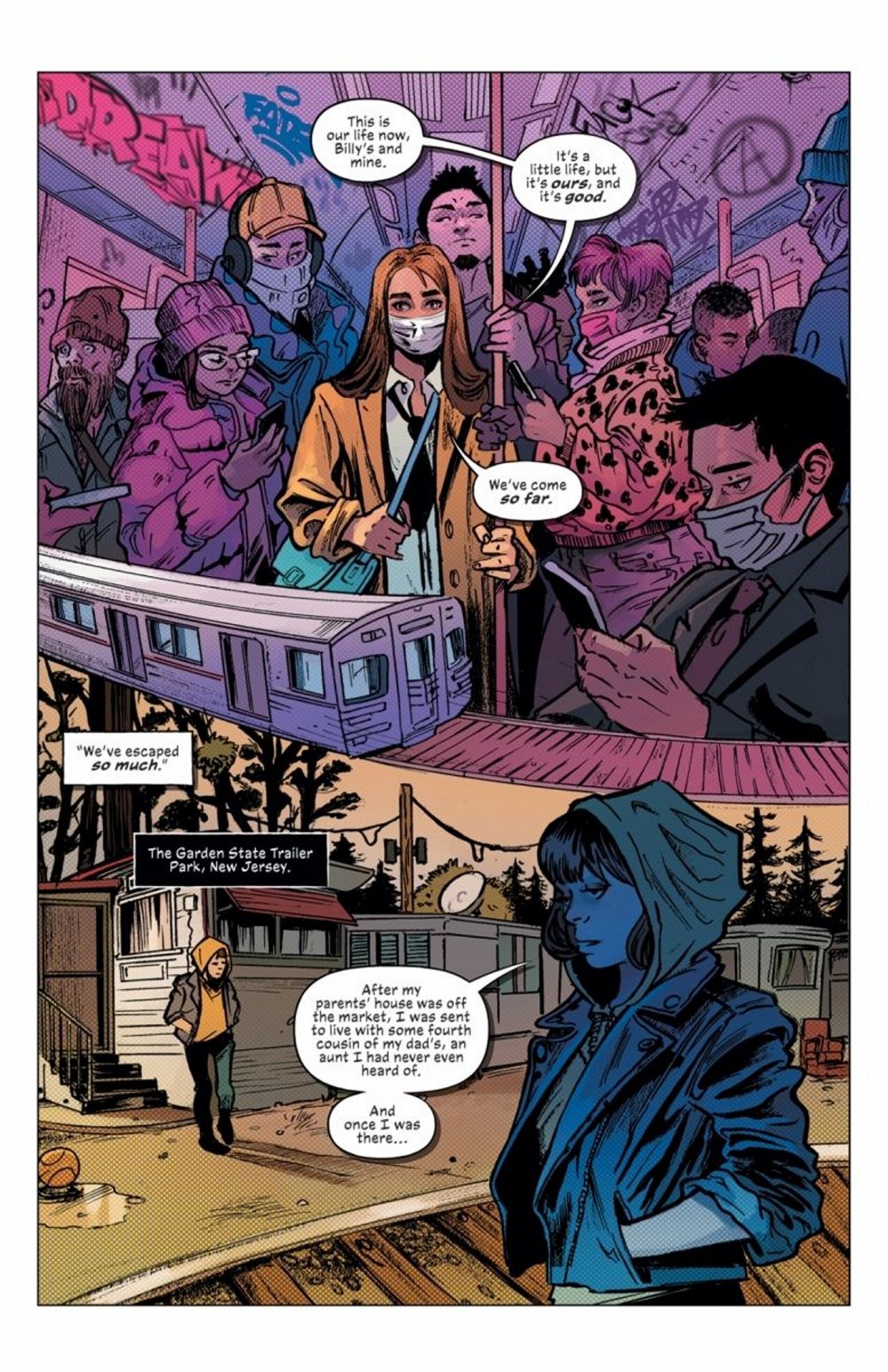
Not to put the horse before the carriage, but would you be open to a medium like television or film?
Emilia Clarke: Sure. I'm a producer; I have a production company. I'm reading books in order to make them into something on the screen. So, in that sense, yes. And I know that exists. But I really don't want people to think that's why this exists. Do you know what I mean?
So, like, sure. But really has been a very frankly selfish exercise, because I wanted to make something. I wanted to create this; I wanted to see what it was like. And if it failed spectacularly, then I'd be on my deathbed being like, "I made a comic. That's really cool."
What elements did you want to bring from your work in cinema to the comic book? Because there's some really good panel structures in this book, in the way it's laid out.
Emilia Clarke: From a visual point of view, I think that the way that we consume media now is so screen-based, from social media to the movies that we are now watching at home to everything. And so, visuals and aesthetics in storytelling that hit home are the cinematic ones; the ones that speak to a bigger world. Because when we're reading a book, the movie of it is playing in our head anyways. So, if you're giving someone those images anyway, you want them to be as big and as bold and as jam-packed to ignite your imagination as possible, I think.
You've mentioned Deadpool a few times, and I kind of get that vibe. Is there anything you do to get into that mode and get that energy?
Emilia Clarke: Yeah... Watch Deadpool over and over again. Watch Beyonce's Lemonade.
I don't know if you guys do this, but you talk to yourself sometimes. Something stupid happens, and you give yourself the commentary. And if someone were to stop you, they'd be like, "Do you think someone's watching you? Because they're not. It's just you and your dog right now, so it's great, that bit you have going. No one else is watching."
I think I just instinctively do that anyway, to try and lighten life a little bit. And I think that's why I'm drawn to that, because you're like, "Oh, my God! I'm not the only one." Maybe Ryan Reynolds doesn't do it himself, but you never know. I feel like the comic book heroes that speak to the individual are the ones that are able to do that; that are able to make light of themselves in their situation and their environment. Because that's what we do, and so you're like, "Oh, cool. This guy's doing it too." That makes me feel better.
Do you feel, after this process or as it goes on, that you're in a space where you could write a script on your own? You could just put it out there in that format? Not to leave Marguerite behind, because obviously, she's a key part of this. But what was that learning experience you had?
Emilia Clarke: Yeah, it was massively [so], because Marguerite would send us the Word documents of the dialogue, of just description of what the page might look like after having spoken to Leila, and then this is what she says and this is what they say.
And there'd be plenty of times where I would go, "Can this line read this? Can this actually be changed to that?" And then there were a few things were she'd be throwing in jokes that were specifically for people who maybe played computer games that I didn't know, or I hadn't heard of. So, I'd be like, "Can you clarify? Am I being stupid? I don't know what that means." And she's like, "Oh, okay. Let me tell you a little secret. Let me tell you about this entire world that you don't know about."
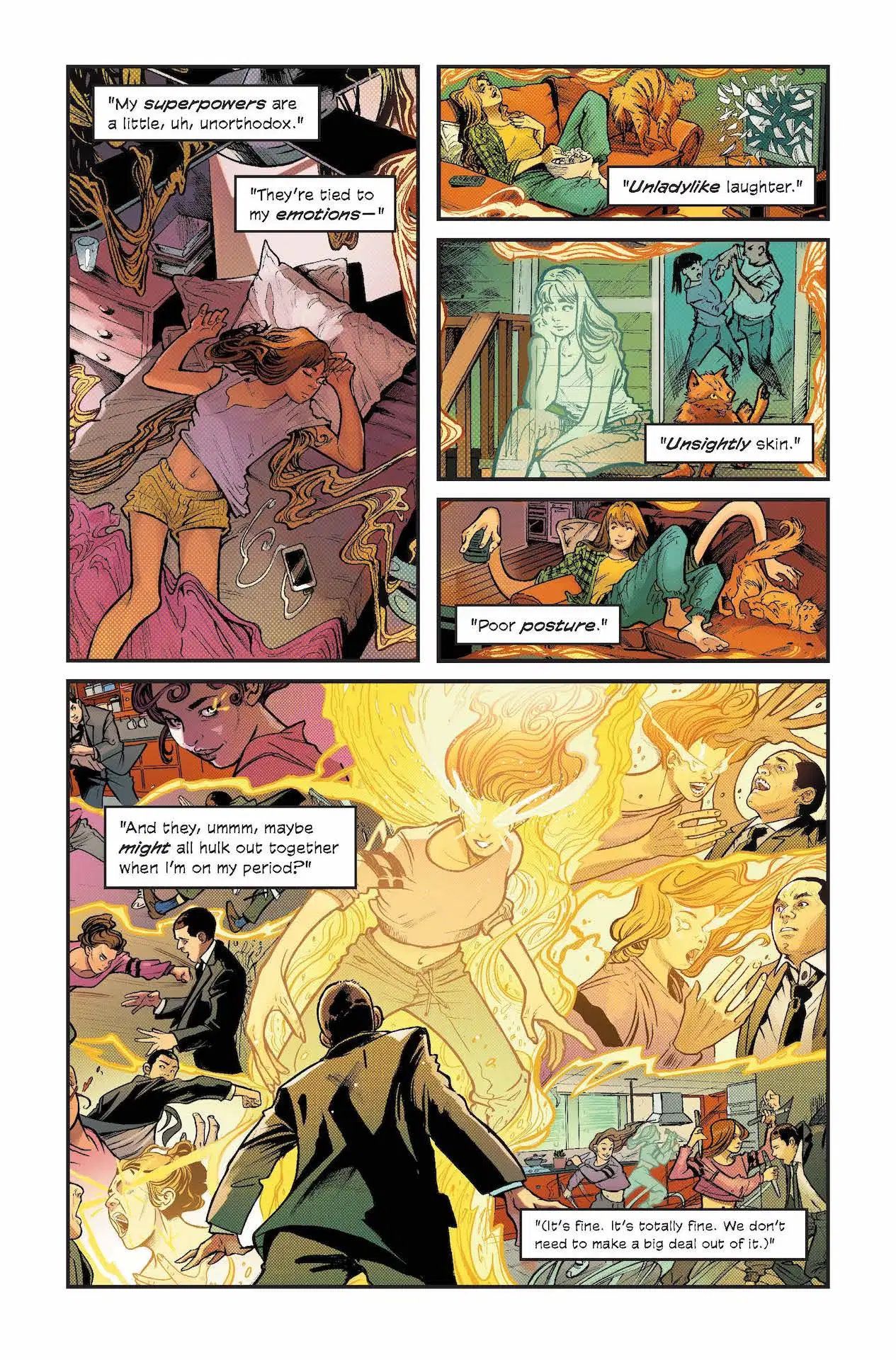
I would like to say yes, but right now that feels like climbing Mount Everest. I'm don't think I'm quite there yet. But it would be amazing to. I got as close to it as I could, in that the script would go back and forth, and back and forth, and back and forth, and back and forth until it was finally locked in. And that process took longer than I thought as well, because I'm British; I've got a British sense of humor. Mother is American; she's got an Americans sense of humor. So there was a slight, like, "How do we merge these two sensibilities together?" Because there'd be some things where she's like, "I don't get that. I don't understand why that's funny." And you're like, "Oh, yeah, okay. That's really specific."
So yeah, it was learning that. But I think because of Marguerite, we have a comic book that many people are going to enjoy. As supposed to, if I sat down and wrote it, maybe my mates would like it. That'd be about it. And my mum.
Would you like to do more M.O.M. in the future?
Emilia Clarke: I mean, sure, yeah. Why not? Let's see how this goes, because this is an entirely self-funded process. Let's see how this goes. It's been wild. It's been genuinely such a fulfilling, cool, fun, different experience. And I do feel like I know more now, obviously. I really feel like I've learned a new language.
I have the ideas, but let's see. I've already written where the next ones would go.
Indie comics are way different than film or TV. How are you going to measure success with this?
Emilia Clarke: I don't know. I really don't know. If people buy it? If someone's going to stop me on the street and ask for a picture or an autograph, or whatever it is. If they say, "I read your comment, and I really liked it." If one person says that, that's success. And I'm not saying this because I'm trying to be all humblebrag. I really, really, really, really mean it.
I've never written anything before. I've never created something on my own before. So, if someone who I don't know - someone who isn't blood related, or my dog, or that I've met many times before - if they say that they like it, then that's amazing. That would be a lot of success.
As a lifelong comic book fan, how is it seeing those pages from Leila come in and getting to hold the physical product in your hand? How is it creating an inclusive comic in this space, with that freewheeling sense of fun?
Emilia Clarke: It's amazing. It's the best thing ever. [For] my production company, I've got a tiny mini baby office space in central London. And the first thing that we did is we got all three covers printed - like huge; like really, really, really big. They're hanging up in the office, and that was the moment where I just lost my mind. Like, a little tear of joy rolled down my cheek.
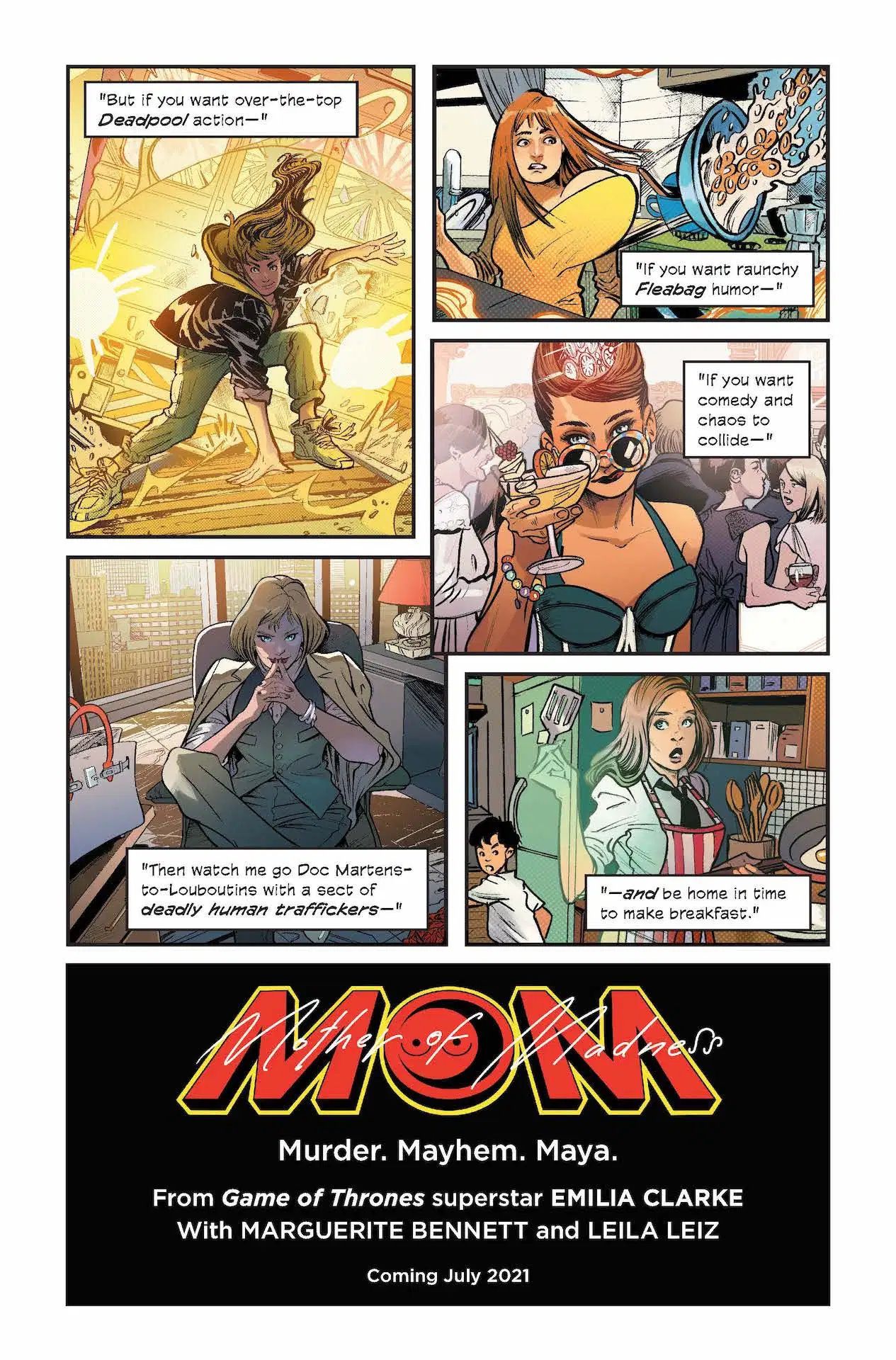
Image is really well known for being pretty much the only comics publisher where you put something out and you own it. What does it feel like for you to have made this thing, and it's not some IP that someone else is grabbing? Because it feels rare nowadays.
Emilia Clarke: Oh, my God, hugely rare. You get to a certain point as an actor where you're like, "All I do is learn my lines and stand where they would like me to stand." And sometimes that can feel really unfulfilling. There are certain jobs where you feel like that's the case.
There's certain jobs where you feel like you're doing the thing you were born to do, and you get everything that you guys love about your jobs. That bit where you just end up feeling like, "Yeah, this is the best!" happens so rarely for an actor. It really, really does. Because it could be that you get it every day on set; it could be that you're in a play, so therefore you are just instinctively going to get it every day - which is why we love the theater. But to have something that is solely mine feels just incredible.
It also feels kind of, if it's not successful? That's okay. That's absolutely fine. I had an idea, and it turned into a thing I can hold. That is not something that I get with my job regularly. That just doesn't exist. So, it's been weird doing press for this, because I'm like, "But I did it already. I made the thing. That's all the stuff." Yeah, it feels just brilliant.
I really liked the subtextual political elements in the book, like the water shortage and the ozone. Especially with NFTs taking over the news cycle in the last couple months, it felt very poignant and well-timed. Was that always part of the world building?
Emilia Clarke: Oh, yeah. Yes, yes, yes. I am, as you probably have read, pretty left leaning. And so any chance I got to just subtly put in a few little things in it, you'll see it littered throughout the whole thing.
The world building of it was integral to it; that was in the PDF. I wanted this to be a world that feel like today but if all, in my opinion, the wrong people were always in charge. This is where we would get to; this is what would happen. We're a hair's breath away from that still being a possibility, which is too frightening for words. But that is what it looks like, and that is crazy and not pleasant.
I wanted that fractious energy to be around Maya all the time, and to be around all the characters all the time. They're constantly having something to break free of and to fight against, where you get to see them even more as an individual. You get to see that they are walking around being like, "Wait, are we crazy? Because we don't feel crazy, but you're telling us that we must be crazy. But this environment that we're living in is crazy."
Because it was pre-pandemic. I wrote it two years ago - three years ago. Christ, the year that just disappeared. I wrote it three years ago, so we were in that space. But yeah, [I did it] for that tension, so everyone's kind of on edge.
Because I believe that the way to create good storytelling is friction; that's where it's born. So, to always have that happening was kind of the plan.
One of my favorite aspects of a comic book is the colors and the textures and the feel of it. Did you talk about color theory or color palettes with the book?
Emilia Clarke: Oh, yeah, hugely. Massively. And that was, again, with our colorist - I didn't know it was an option. I wanted to find the most, like, kapow! I wanted it to be as bright and electric as possible. I wanted everything to be that much more pimped, because you can because it's a comic.
I also wanted things that you just can't get, like I wanted it to be really thick pages and really shiny - really, really glossy. They were sending me over the examples, and I'm like, "Okay, this is regular gloss. Why don't we just cover it in hairspray? Why don't we put some nail varnish on it?"
In my wackadoo world, it would be like a hologram, or there would be 3D stuff. You know when you were kid and you used to get those books that were really thick and moved? I wanted everything to look as wild as possible, just because that's my taste.
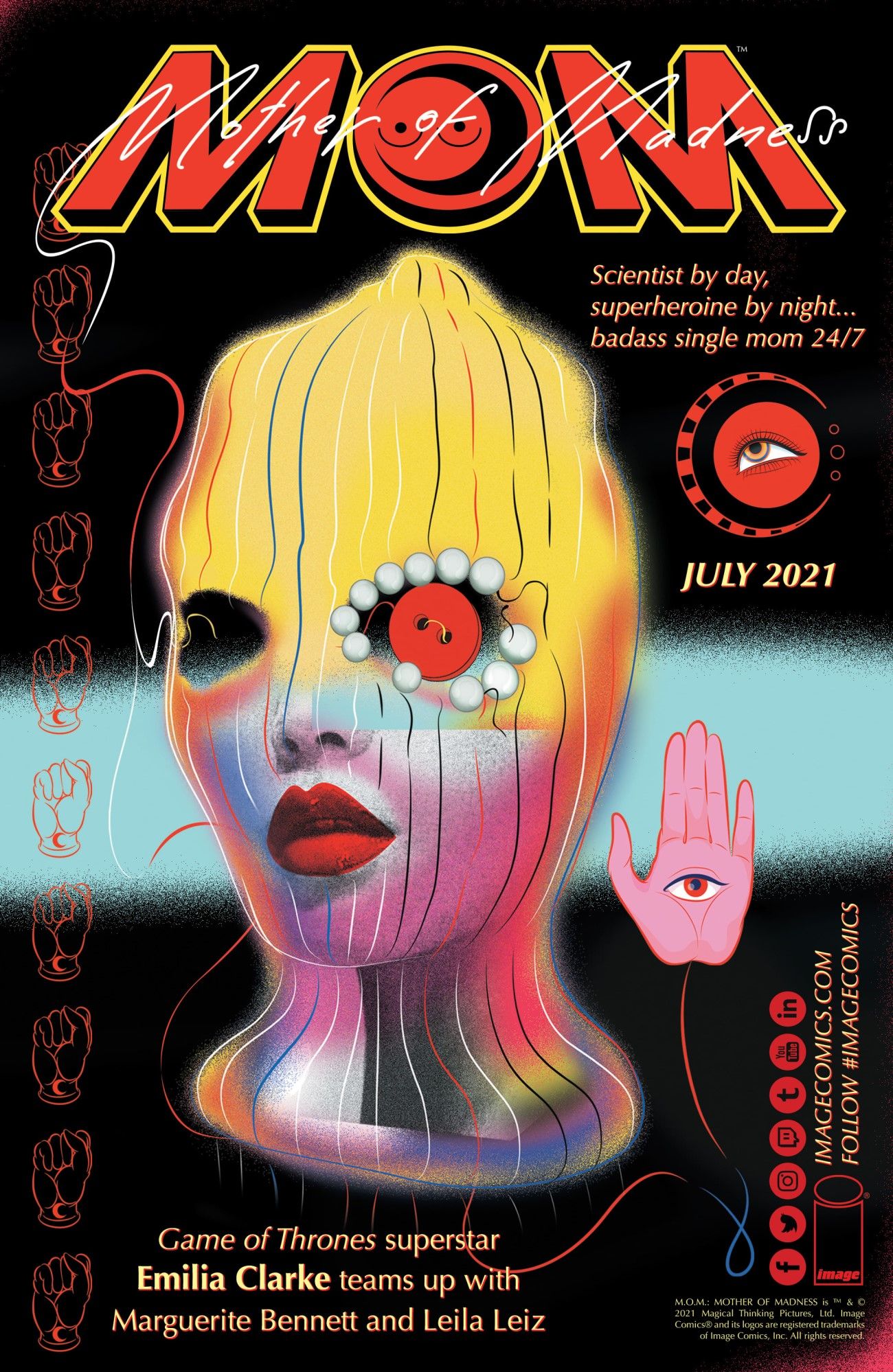
Did you want to play with ideas of madness?
Emilia Clarke: Yeah, yeah. I mean, the Mother of Madness thing was obviously... I thought it'd be funny if I did something that was the mother of something, and then that it spells mom. I do feel like this goes across everyone; you feel mad, you feel crazy. Either from a frustration point of view, either from a "What's the world coming to?" But also just that I feel like everyone in their life goes through many moments in a day maybe even, where they feel like they've lost their minds. And you're in a world where that is entirely possible.
Of course, being British as well, it should be mum.
Emilia Clarke: I know, yeah. My own mother did bring that up, and I was like, "Don't correct me! Can you just allow some poetic license here?" Mother Under Madness doesn't have the same ring to it.
M.O.M. Mother of Madness arrives on July 21st wherever comic books are physically and digitally sold.
No comments:
Post a Comment